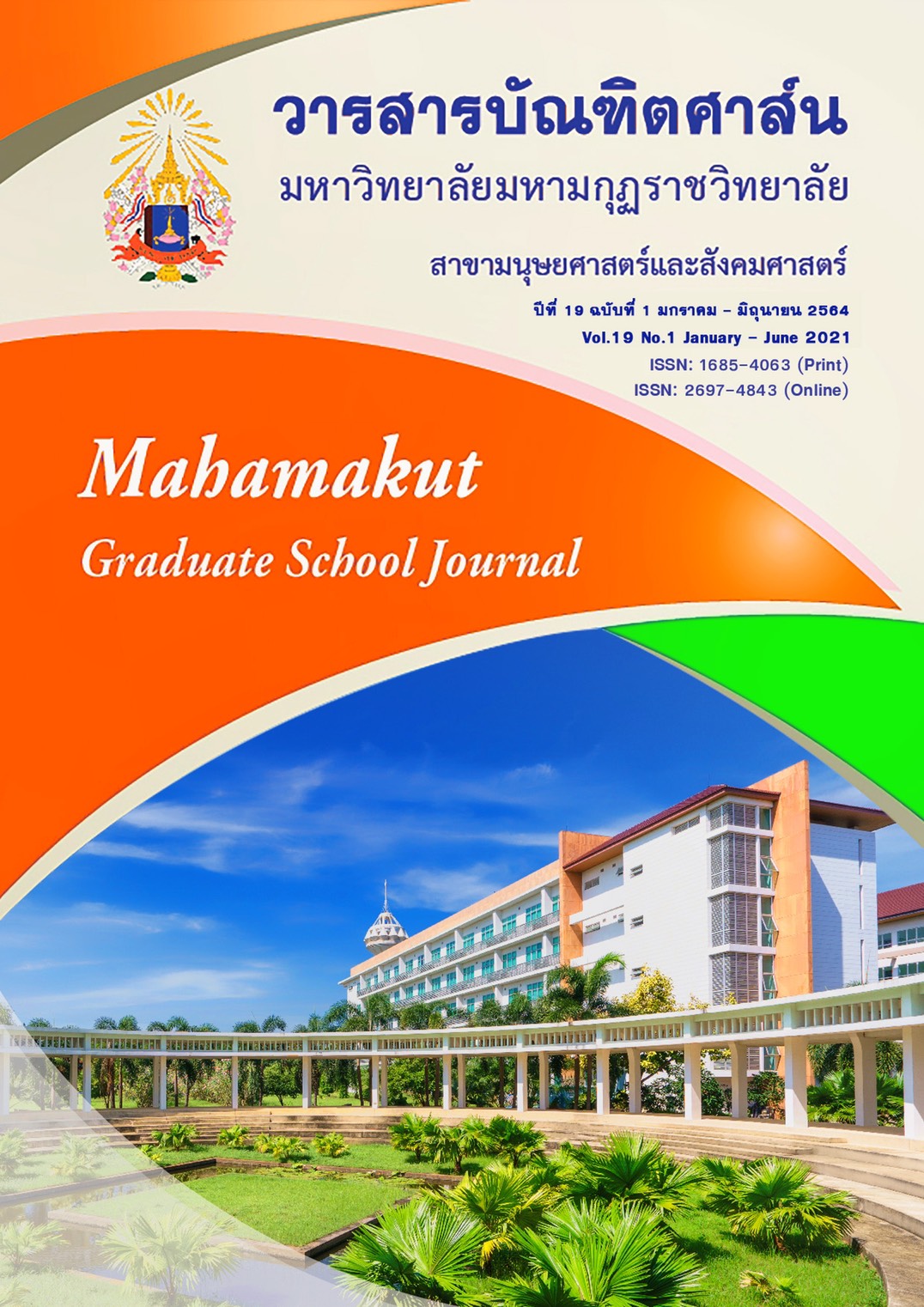การดำเนินชีวิตตามหลักทิศ 6 ในพุทธปรัชญาเถรวาท
คำสำคัญ:
การดำเนินชีวิต, หลักทิศ 6, พุทธปรัชญาเถรวาทบทคัดย่อ
วิทยานิพนธ์เรื่อง “การดำเนินชีวิตตามหลักทิศ 6 ในพุทธปรัชญาเถรวาท” เป็นการศึกษาเชิงคุณภาพ (Qualitative study) แบบวิจัยเอกสาร (Documentary Research) โดยมีวัตถุประสงค์ ดังนี้ 1) เพื่อศึกษาหลักการดำเนินชีวิต 2) เพื่อศึกษาหลักทิศ 6 ในพุทธปรัชญาเถรวาท 3) เพื่อวิเคราะห์การดำเนินชีวิตตามหลักทิศ 6 ในพุทธปรัชญาเถรวาท
ผลการวิจัยพบว่า
- 1. ชีวิตมนุษย์ เป็นปัจจัยที่สำคัญยิ่งต่อการพัฒนาสิ่งต่าง ๆ ต้องทันต่อการเปลี่ยนแปลงของสังคม เพราะในปัจจุบันนี้มีปัจจัยหลายอย่างที่เข้ามากระทบต่อการดำเนินชีวิต การดำเนินชีวิตไม่ว่าแบบใดหากขาดความตระหนักในหน้าที่บทบาทความรับผิดชอบมนุษย์จะปราศจากคุณค่าทันที มนุษย์จะมีชีวิตที่ผาสุขได้ควรมีหลักยึดเหนี่ยวจิตใจในการดำเนินชีวิตไม่ข้องเกี่ยวกับอบายมุข ให้ความสำคัญกับหน้าที่ของตนเองและปฏิบัติต่อผู้อื่นด้วยความเข้าใจรู้ในหน้าที่บทบาทความสัมพันธ์ของคนรอบข้างเป็นสำคัญ
2.หลักทิศ 6 เป็นหลักธรรมที่ บุคคลจะพึงทำหน้าที่ต่อกันด้วยหน้าที่ที่บริสุทธิ์ที่มนุษย์พึงปฏิบัติต่อสังคม ซึ่งเป็นแนวปฏิบัติที่สามารถส่งเสริมการดำเนินชีวิตของมนุษย์ให้ดีงาม ทั้งในส่วนปัจเจกและส่วนรวม ช่วยให้ปัจเจกบุคคล สามารถดำเนินชีวิตส่วนตัวได้อย่างมีความสุข และสังคมส่วนรวมก็ดำรงอยู่อย่างปกติสุขด้วยอันมีหน้าที่ 6 ประเภทได้แก่ 1. ทิศเบื้องหน้า บิดามารดา 2. ทิศเบื้องขวา ครูอาจารย์ 3. ทิศเบื้องหลัง ภรรยา 4. ทิศเบื้องซ้าย มิตรอำมาตย์ 5. ทิศเบื้องล่าง ลูกจ้าง ทาส กรรมกร 6. ทิศเบื้องบน สมณะพราหมณ์
3.การดำเนินชีวิตตามหลักทิศ 6 เป็นวิธีการส่งเสริมต่อการปฏิบัติหน้าที่ ที่ถูกต้อง อันมนุษย์พึงปฏิบัติต่อกัน ในการดำเนินชีวิตประจำวัน ทำให้คุณภาพชีวิต และสภาพของสังคม ที่แวดล้อมตัวเราดีขึ้น เพราะทุกคนรู้หน้าที่และมีความรับผิดชอบต่อหน้าที่ ที่จะพึงปฏิบัติต่อผู้อื่น ที่ตนเกี่ยวข้องด้วย การดำเนินชีวิตเป็นสิ่งจำเป็นอย่างยิ่ง ที่จะต้องดำเนินไปให้มีคุณภาพ อาศัยองค์ประกอบของชีวิต ซึ่งเป็นปัจจัยที่สำคัญยิ่งต่อการพัฒนาชีวิตให้มีคุณค่า และอยู่ร่วมกันในสังคมอย่างสันติสุข
เอกสารอ้างอิง
มหามกุฏราชวิทยาลัย, มูลนิธิ. พระไตรปิฎกและอรรถกถาแปล ฉบับมหามกุฏราชวิทยาลัย เล่ม 1, 15, 16, 19, 21, 24, 34, 35, 36, 37, 45, 71. (พิมพ์ครั้งที่ 5). กรุงเทพฯ: โรงพิมพ์มหามกุฏราชวิทยาลัย, 2554.
โสภา ชปีลมันน์. ครอบครัวไทยที่พึงปรารถนาในสังคมเมืองในประเทศไทย. กรุงเทพมหานคร: สภาสังคมสงเคราะห์แห่งประเทศไทย, 2534.
พระพรหมคุณาภรณ์ (ป.อ.ปยุตฺโต). พจนานุกรมพุทธศาสน์. ฉบับประมวลศัพท์. (พิมพ์ครั้งที่ 14).
กรุงเทพฯ: ธนธัชการพิมพ์, 2553.
พระธรรมปิฎก (ป.อ. ปยุตโต). พจนานุกรมพุทธศาสตร์ ฉบับประมวลศัพท์. (พิมพ์ครั้งที่ 11). กรุงเทพมหานคร: มหาจุฬาลงกรณราชวิทยาลัย, 2546.
อภิชัย พันธเสน. พุทธเศรษฐศาสตร์: วิวัฒนาการ ทฤษฎี และการประยุกต์กับเศรษฐศาสตร์สาขาต่าง ๆ. กรุงเทพมหานคร: อมรินทร์, 2543
ดาวน์โหลด
เผยแพร่แล้ว
รูปแบบการอ้างอิง
ฉบับ
ประเภทบทความ
สัญญาอนุญาต
ลิขสิทธิ์ (c) 2021 มหาวิทยาลัยมหามกุฏราชวิทยาลัย

อนุญาตภายใต้เงื่อนไข Creative Commons Attribution-NonCommercial-NoDerivatives 4.0 International License.
บทความวิชาการและบทความวิจัยในวารสารฉบับนี้ถือเป็นความรับผิดชอบของผู้เขียนเท่านั้น บทความที่ได้รับการตีพิมพ์ในวารสารบัณฑิตศาส์น ถือเป็นลิขสิทธิ์ของมหาวิทยาลัยมหามกุฏราชวิทยาลัย ตามพระราชบัญญัติลิขสิทธิ์



